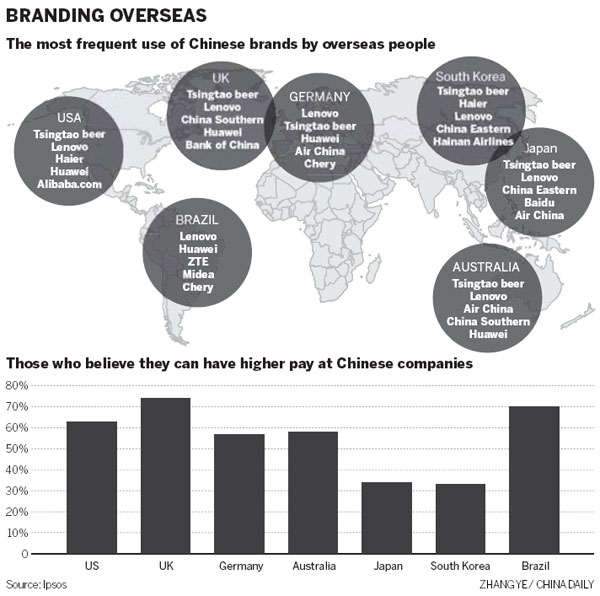Experts urge strong branding
|
Members of a Norwegian band drinking Tsingtao beer at the Qingdao International Beer Festival, Shandong province. Tsingtao beer is one of the most familiar Chinese brands that foreigners recognize. Zhou kun / For China Daily |
Tsingtao beer held up as example of powerful Chinese marketing
Elton King, a backpacker traveling around the world, has decided to stay in Qingdao, a coastal city in Eastern China for a couple of years. "It's really a fantastic city - nice beach, beautiful old buildings and friendly people. Most importantly, wonderful Tsingtao beer," said the 38-year-old Briton, laughing.
King recalled that his first sip of Tsingtao beer (Tsingtao is the English name of Qingdao) was in a small pub in Leeds, when he was 19. Traveling through nearly 30 nations during the last decade, he tasted Tsingtao beer almost everywhere, from North America to Europe, from Australia to Southeast Asia, and even Africa. "There is little difference in the beer in different places," he said.
King signed a contract to teach English at a middle school in Qingdao, intending to experience local culture and "drink authentic Tsingtao beer", he said.
Tsingtao beer is one of the most familiar Chinese brands recognized by foreigners. According to a survey conducted by Ipsos, the world's third-largest market research company, and the Chinese magazine Global Entrepreneur, many Chinese brands have gained recognition among foreigners, but the usage of these products or services remains quite low.
The survey, conducted between Dec 3 and 12, covered seven nations - the United States, the United Kingdom, Germany, Australia, Japan, South Korea and Brazil - with 200 respondents in each. It interviewed 39 Chinese companies with global businesses, including Lenovo Group, Haier Group, Tsingtao Brewery Co Ltd and Huawei Technologies Co Ltd.
International recognition
Tsingtao beer was top among the 39 brands bought by foreigners. A total of 18 percent of the 1,103 respondents said they had drunk Chinese-made beverage. Tsingtao was very popular in South Korea with 31 percent of South Korean respondents saying they had bought the drink, and in Japan where 44 percent had tried it.
Lenovo followed Tsingtao - 16 percent of those surveyed said they are using or had used Lenovo computers. Third was Huawei, whose communication services were used by 7 percent of the foreigners surveyed.
"Tsingtao and Lenovo both have a very strong foreign heritage. Furthermore, they have positioned themselves well in various global markets with strategic partnerships. Using this foundation when managing their business overseas, the two companies can use their strong roots in China to successfully operate in the Southeast Asian markets, while leveraging their global strategic partnerships to win business abroad," said Edwin Song, head of Ipsos marketing understanding and measurement, Greater China.
Tsingtao set up a partnership with Anheuser-Busch Companies Inc to successfully penetrate the North American market. Thanks to the acquisition of IBM Corp's personal computer unit in 2005, Lenovo's products were accessible by many foreign companies and institutions through group purchasing. In 2010, Lenovo set up a $175 million joint venture with Japan's NEC Corp and acquired Medion AG, a German multimedia and consumer electronics maker.
Although "cheap" is still synonymous with Chinese products in the international market, people overseas now find that a low cost but high performance or reasonable ratio of performance and price is how Chinese brands compete with multinational brands.
In the survey, 64 percent of respondents, especially those in Japan and South Korea, regarded "cheap" as a key attractive element when choosing Chinese-made products. A total of 61 percent of the interviewees recognized that low cost but high performance was a distinction of Chinese products.
Keeping a balance between price and quality is not an easy thing for Chinese companies to achieve: They are faced with ever-increasing costs of labor, natural resources and logistics, said Song. "The key to reducing the pressures from manufacturing and materials costs is more investment in factories in less developed nations and the acquisition of local companies. This is the same model used by many foreign companies such as Unilever and Procter & Gamble," said Song, adding that in order to maintain profitable margins, companies need to strengthen the competitiveness of their products - in other words, focus on product value.
He said that it's hard to predict which brands will boom in the international market over the next three to five years. In this Internet era, with the development of online business and the rapid spread of information, many brands have the opportunity to be favored by foreigners, but it all depends on the execution of their branding strategies.
"There is an opportunity for Chinese luxury brands to achieve this growth. Luxury brands with a Chinese theme are highly appreciated by foreigners. If supported by strong marketing and brand communication, we might see these Chinese luxury brands appearing overseas," Song said.
Brand promotion
Jin Zhiguo, chairman of Tsingtao Brewery, said during the sessions of National People's Congress and the Chinese People's Political Consultative Conference in March, that the company was listed among the Fortune 500 companies last year. "Tsingtao beer is ranked as of the most valued global brands by Interbrand, the world's leading brand consultancy. What we did during the 2008 Olympic Games - our cooperation with the US National Basketball Association and the annual international Tsingtao Beer Festival - made a great contribution to our status. We will continue to invest in such marketing activities to enhance the image of our brand," said Jin.
Song agreed with this strategy. "Chinese brands should associate themselves with international mega events - athletic, social, and charitable - such as world sports and the Olympics," he said.
The brand analyst also said that Chinese brands need to own characteristics that are authentically Chinese. "In recent history, China has not created uniquely distinctive Chinese brands. In order to communicate the brand's essence, it must exude its Chinese heritage," Song said.
He also said that market research is still underutilized, focusing mainly on evaluation. "Companies should take advantage of research to better understand the market in order to create more branded and creative Chinese products," Song added.
liujie@chinadaily.com.cn

(China Daily 04/10/2012 page14)



















